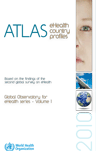
This publication presents data on the 114 WHO Member States that participated in the 2009 global survey on eHealth. Intended as a reference to the state of eHealth development in Member States, the publication highlights selected indicators in the form of country profiles. The objectives of the country profiles are to: describe the current status of the use of ICT for health in Member States; and provide information concerning the progress of eHealth applications in these countries.
A total of 114 countries (59% of WHO Member States, representing 81% of the world's population) completed at least one section of the survey. The survey responses were based on self-reporting by a selected group of eHealth expert informants for each participating country. Although national survey administrators were given detailed instructions to maintain consistency, there was significant variation across participating Member States in the quality and level of detail in the responses, particularly to descriptive, open-ended questions. While survey responses were checked for consistency and accuracy, it was not possible to verify all responses to every question.
The scope of the survey was broad; survey questions covered diverse areas of eHealth, from policy issues and legal frameworks to specific types of eHealth initiatives being conducted. While every effort was made to select the best national experts to complete the instrument, it was not possible to determine whether they had the collective eHealth knowledge to answer each question. Further, there is no guarantee that national experts used the detailed instructions included with the survey when responding.
Due to layout restrictions, additional information provided by Member States could not be included in these profiles. The country survey tools may be downloaded from the following web site: http://www.who.int/goe. All country profiles can be accessed at the same URL as well as the full country data sets.
Download ATLAS - eHealth Country Profiles (.pdf, 2.620 KB).
Download from eHealthNews.eu Portal's mirror: ATLAS - eHealth Country Profiles (.pdf, 2.620 KB).
About Global Observatory for eHealth
The Observatory's mission is to improve health by providing Member States with strategic information and guidance on effective practices and standards in eHealth.
Its objectives are to:
- provide relevant, timely, and high-quality evidence and information to support national governments and international bodies in improving policy, practice, and management of eHealth;
- increase awareness and commitment of governments and the private sector to invest in, promote, and advance eHealth;
- generate knowledge that will significantly contribute to the improvement of health through the use of ICT; and
- disseminate research findings through publications on key eHealth research topics as a reference for governments and policy-makers.
© World Health Organization 2011